- Home
- Al Sarrantonio
Five World Saga 01 Hornets and Others Page 10
Five World Saga 01 Hornets and Others Read online
Page 10
"Sounds more like coincidence," Miss Debicker said.
"That's for you to find out. There's an alcove by one of the Grand Central subway entrances where the better known bag ladies in the area are supposed to live." Miss Debicker didn't mention that she had seen one of them that morning. She was told her story would be due in a few days.
It took her fifteen minutes to get to Grand Central Station and, after arguing with the cab driver over the fare, she was unable to find the woman. Then, after twenty minutes of wandering around Grand Central, she discovered the alcove her editor had mentioned. It was a dark niche cut into the wall. She hesitated a moment, then walked into the darkness.
A woman, possibly the same one she had seen that morning, was crouched in the farthest corner, her shopping bag clasped to the rags covering her chest. In the half light her eyes looked glazed.
Miss Debicker bent over the woman and turned on her tape recorder. The woman looked up suddenly and her eyes seemed to focus on her with an animal wariness. Miss Debicker wished she had a flashlight.
"What are you doing here?" she asked, and felt her voice swallowed by the dust and darkness.
There was no answer, only that wary look.
"I'd like to be your friend," she said, as if talking to an idiot child. The woman pulled back deeper into the darkness.
Miss Debicker fumbled in her shoulder bag and drew out her cigarette lighter. She flicked it on and moved closer, over the woman. "How long have you lived like this?"
The woman threw out an arm, "Get back," she said in a harsh whisper. "Go away."
Miss Debicker took a deep breath and, fumbling for her wallet, drew out a ten-dollar bill. "This is for the interview," she said. "Just answer my questions and I'll leave you alone." The woman stared at the bill but did not take it. Miss Debicker thrust it closer. "Just for seeing what's in the bag, your clothes and things. You can buy wine."
"Go away."
Miss Debicker sighed, returned the bill to her shoulder bag, and walked away. At the mouth of the alcove she turned to look at the bag lady.
"You have no love," the woman said.
Miss Debicker was startled; but quickly reached into her shoulder bag and dropped the ten dollar bill behind her as she re-entered daylight.
On another gray morning Miss Debicker took her subway train downtown, but at 591 Street, the train was stopped with the doors opened. Eventually the doors slid shut, and the train began to move. At that point the conductor announced over the P.A. system that the train would now travel on 81 Avenue, due to trouble on the line. Miss Debicker shook her head, tight-lipped. The train stopped at Times Square and she got off.
Forty-second street was filthier than she remembered it being, and at nine in the morning, with the grayness of the day and the lack of bright lights, the dirty movie houses and sex shops looked more depressing than usual. Miss Debicker was glad she worked on the East Side. She turned down forty-fourth street and suddenly found herself in the theater district. She hadn't been in this area for quite a while, and was taken aback by the fact that the respectable, clean theaters were so close to the smut houses. She quickened her steps: though she was rarely afraid of the city she found herself suddenly longing to reach the well known, safe path she followed every day. Shifting her gaze from the marquis, she glanced at the pavement where an object caught her eye.
She stopped to look at it for some unaccountable reason: there was something strange about this object: a symmetry in the way it was placed on the sidewalk, a deliberateness about its appearance. She stooped to examine it more closely.
It was a small box-like cube, about four inches square on a side. It was maroon in color, and the color darkened around the edges as if it had bled into the corners. It appeared translucent, like a polished dark gem. Because it appeared so perfectly placed, it looked as if it were attached to the sidewalk.
Miss Debicker stood up suddenly, glancing at her watch. She stepped over the cube and walked toward the end of the block. After a few steps she glanced over her shoulder and noticed that it was still there, at rest on the filthy sidewalk; no breeze had stirred it, no cat had darted out of an alley to bat it away; it had not disappeared in the wink of an eye. She shook her head at her foolishness and walked toward the Avenue of the Americas, then again glanced back at the cube. It was still there, a purple smudge on the dirty pavement.
She shook her head, to clear it. She wanted very badly to be at her desk, but she also wanted to look at that cube again. Retracing her steps, she rationalized her action as an interesting diversion from the normal routine. Then she stopped before the cube and stared at it.
It had not changed. It still looked symmetrical and like a large polished stone. Perhaps it belonged to someone from the diamond district. Perhaps someone had been making a delivery, and a hole had appeared in the bottom of a leather bag, and this stone had fallen out onto the sidewalk. But her journalist's mind wanted to know why it had landed so perfectly placed. Why hadn't it tumbled up against a storefront or dropped off the curb into the gutter?
She bent to pick it up, looking quickly around. There was no one watching her. It wasn't as if she was afraid to be seen picking up this cube; it was just that she now felt aware of a strange weakness. She was determined to walk to the end of the block and cross the street and go away from this thing.
Miss Debicker glanced again at her watch; she would now be very late for work. This foolishness had cost her more time than she could legitimately justify; at the office it would be a mark against her. Yet she wanted to turn around and look at the cube again. She had to, and this urgency frightened her; it was as if some magnetic influence was pulling her around toward the cube. She found herself walking back to it.
She had a fleeting thought about how strange it was that she happened to walk down this particular street, that her train happened to be diverted to Times Square on this particular day.
The cube looked the same; it had not moved; it was the same maroon with the concentration of color at the edges. She tried to look at her watch, and with great effort looked at her shoes, but her eyes instantly returned to the six-sided figure.
She tried to scream out, to attract the attention of the people hurrying by, but her mouth would not work. Some sort of control was being exerted over her. Then quickly she transferred all her will from the cube to her legs and tried to run toward the Avenue of the Americas, knowing she would then be all right, everything would be all right. Her feet began to stumble. A few more steps now. A pedestrian glanced at her and hurried on. She stopped as if a wall had been thrown up in front of her. She could not go on. In a few moments she would turn and walk, or crawl, or run, back to the maroon cube. She turned and stumbled back.
A few moments later she picked up the cube, and felt a compulsion to hide it. She didn't know why she should do this, but she found a safe place under some theatrical props between two theaters, and hid it there. It was cool to the touch, like smooth marble, but there was nothing else remarkable about it.
That night she hid in the entrance to the alley, out of the bright lights of the theater district, guarding it.
In the days that followed Miss Debicker spent her time in the vicinity of the maroon cube. She found there were periods—short periods of time—when she was allowed to leave the cube to find something to eat or relieve herself. She was not allowed to go beyond a certain vaguely defined area about two blocks square, and she always found herself back in front of the cube. During the day she hid in alleyways between the theaters, and at night she slept not far away.
It was now winter, and she had run out of money. She was dirty and disheveled-looking; she shivered uncontrollably. She foraged for food in her two-block area, and began to beg. Sometimes she was bothered by the police or a passerby, but the neighborhood was used to her presence now. She was learning when to hide and when to beg profitably.
The maroon cube stayed hidden under the stage props. She usually slept in the alleyway by it when s
he slept at all. Her dreams were fitful and, even in sleep, she could feel the tug of the dark cube.
During the first few weeks she learned, through scraps of newspaper stories, that the police were doing a missing persons search for her. This had bothered her slightly, but when the stories stopped, she no longer thought about it.
The first really cold day came and she knew that she must find indoor shelter for the winter. Her original clothes had been discarded and she wore the various rags which she picked out of garbage cans; she even had a few pieces of costume from discarded wardrobes. She went to the alley and the cube. She thought she would make out all right during the cold months; the begging was better during the holidays. She'd taken to keeping her possessions, pieces of clothing, salable items picked from garbage cans, bits of food, in a plastic shopping bag.
The days grew colder. A few days before Christmas the cube called her to its hiding place; she cleared away a dusting of snow and dug it out from under the rubble. It felt cold in her hands and though it looked no different than it ever had she knew it was content and full when she was this close.
She put the cube in her plastic bag, at the bottom, in the warmest place. It would stay there, her prize possession; it would always be a part of her; she would always keep it in her bag.
She walked out to the street and began begging, her bag close to her. She searched the faces closely and was startled when a gray-haired man appeared, walking briskly toward her. She averted her eyes and he did not recognize her; he passed by, leaving a quarter in her cracked palm. Her editor...
She began to study faces again. Most of them were bright with the glow of the holidays, or at least happy. She knew, though, that sooner or later her eyes would meet those of a woman that were hard and empty. And when she met those eyes, she would say, holding her bag to her frozen breast, "You have no love."
The Red Wind
This night I will be with my Natisha in a place far away from here, where her dull, dead body, and the red wind that will soon carry me away, are just vague remembrances that will no longer have meaning. There must be such a place, or all that has come before makes all life and youth impossible and evil. This night—
But there is little use in the end of the tale coming first; the begin-fling must suffice...
I came to Castle Mayhew two fortnights ago at the bidding of the Count himself. His letter stated that he was in desperate need of my services as an architect, and left the details to my imagination. I am not one who craves mystery, and was inclined to turn his offer down, but my fiancé Natisha, with me in Menz, urged me so strongly to take the commission that I was forced to reconsider.
"The Castle is in a beautiful area," she said, "and with the stipend he offers we can be married."
"So you know this area?" I teased, for I had yet to learn where this creature who had stolen my heart came from.
"You must do it," she said, and then went off into a lengthy discussion of what our married life would be like once my already bright career was solidified by this new project and the monetary award attached to it; and before I knew it I was packed and on my way, waving to Natisha who stood on the train platform promising to write each day and even make her way to the Castle if possible.
"But you will be with me in my heart every moment," she said as the train pulled off, blowing me a kiss, and I watched until her lithe little form was finally lost to view as we rounded the first long curve on our journey.
It was only then, as the train wound into the mountains, that I began to wonder what sort of adventure lay before me.
When I arrived three days later at the town at the foot of the Castle, night had fallen and a chill wind blew a frosted mist through the deserted streets. I entered a tavern, also curiously empty, and, after pounding on a table to be served, finally resorting to shouts for someone to appear, an old man, with a dark coarse cloak thrown about his shoulders, emerged from the back room and asked me what it was I wanted.
"A loaf of bread, some cheese," I answered gruffly, for I was both tired from my journey and annoyed at the slowness of the old man's movements and the dullness of his speech. He nodded tiredly and turned into the back room.
I waited ten minutes, and when the old man did not return I began to pound on the table once more. By now I was nearly enraged. I was about to rise and follow him into the back room when he emerged, with someone at his side. This new figure was also cloaked, his face even more wrinkled and time-worn than his companion's.
The older man approached me. "You are Herr Begener?" he inquired in a listless monotone.
"I am," I said, rising.
"Why did you not come directly to the castle?" he continued. "Count Mayhew has been waiting for you. You were told to come as soon as possible."
There was something about his cold voice that unnerved me. "I was tired," I sputtered, not believing his spiritless impertinence; "1 thought I would rest before climbing the road; perhaps even spend the night here. Besides, what is it to you?"
"You will follow me now," he said.
"But I have not eaten! I am tired—"
"There is neither food nor lodging here."
He turned away from me and as he did so, I reached out, dislodging his robe from his shoulder and revealing, on his back, a neat line of small round red welts. With a slow motion he merely reset his robe in place and disappeared, he and his companion, into the back room.
Half in rage and half in consternation, I rose and gathered my things to follow. I saw that the back room led directly to a door leading to the road. By the time I caught up with the two monk-like figures my anger had abated. There was no point in arguing. In silence we began the long, slow ascent to Castle Mayhew. We passed no one in leaving the town, and no one on the road.
"Look here," I said finally, turning to my robed companions. "I really should demand an explanation. Why is the town so empty? And why is it so important that I reach the castle tonight?"
My enquiries were met with silence, as the two old men continued grimly, gray heads bent.
By the light of a setting moon we reached the castle porch where the two cloaked figures promptly left me, turning off to the left. A few moments later I heard the dull slow tramp of feet ascending a metal stair. I stood silent, contemplating an abrupt about-face and a brisk walk back down the hillside, through the town and away from this place forever, but the bevy of arguments against this which my mind had readied, chief among them my wish to please Natisha, were not even brought to bear upon me because the oaken door was pulled open and I suddenly found myself standing in a huge vaulted hallway. The door was closed behind me by another robed figure, this one small in stature.
When he turned around I was startled to note that his face was not old and wrinkled, and I was pleased to realize that his countenance was a most amiable one, with the features of a smiling cherub. He rushed to me and took my hand.
"Herr Begener, it's so nice to have you here; we've all been waiting. The Count will be so pleased. Let me show you to your room—you can't know how good it is to see you've arrived!" This frantic speech was accompanied by wild gesticulations of the hands, and the little fellow gave such an impression of a happy little child that I almost reached down to pick him up. But in a second he had a bag of mine in each hand and was leading me up the marbled stairway to a room on the second floor.
"I know you'll want to freshen up," he said after he had settled me in, "so I'll tell the Count to meet you in the dining hall in fifteen minutes. There will be a late supper, and some fine wine." And with that he was gone.
A quarter hour later, shaved and washed and dressed in clean linen, and feeling immensely better, I found myself ushered into the huge dining hall of the Castle Mayhew. A grand portrait hung over the fireplace of a man I assumed to be the Count—a tall, imposing figure, straight as an arrow with fine features; the eyes were powerful but not at all hard.
There was a sound behind me and I turned to find myself face to face with the man i
n the portrait—only with a horrible difference. The man before me was old, older than any man I had ever seen before—a mere bag of bones on a bent skeleton. The arrow-straight figure was warped, the noble bearing shrunken, the eyes filled with weariness yet still imbued with a kind of fire.
"I am Count Mayhew," he said, his voice strong but low, his hand grasp lighter than I would have expected. "Please sit down and as you eat we shall discuss the matter of your employment. As I mentioned in my correspondence, I am in a great hurry for the work to be completed."
"You realize of course that things can't be done overnight, that materials and labor—"
"Please," he said, motioning toward the table, his voice impatient. "We will discuss all of this."
I sat, and was treated to a sumptuous meal while Count Mayhew regaled me with his plans. The Count, I noted, ate nothing, though his eyes seemed to linger over each course with a strange hunger. I went so far as to offer him a portion of my veal, but he refused curtly.
"As I mentioned," he said, "there is a great urgency involved in your work. There are workmen presently in the castle and completely at your disposal; any materials that are not presently at hand can be acquired promptly. There are couriers and craftsmen to do whatever is asked of them."
He went to a side table under the huge portrait and slid out a bottom drawer, removing a large sheaf of papers. These he spread before me. "The basic plans," he said, "have already been drawn up. It is your job to make structural refinements and to direct actual construction." I stared at the top sheet intently, and then glanced quickly through the rest. They all showed various views of a high-domed room with a strange box-shaped structure supported by cross-beams raised in the center of it. "The dome is of wood," the Count continued, looking over my shoulder, "and there are removable panels on the top to open the room to the air. The platform," he continued, pulling out a blueprint from the bottom of the pile and indicating the squarish structure, "must be made with the utmost precision, and the dimensions as elucidated on this paper must be followed to the letter. Any deviation could ruin the entire project." His hand swept over the platform itself, where two rigidly constructed chairs were indicated, side by side.

 Five World Saga 01 Hornets and Others
Five World Saga 01 Hornets and Others Cold Night (Jack Paine Mysteries)
Cold Night (Jack Paine Mysteries) Haydn of Mars
Haydn of Mars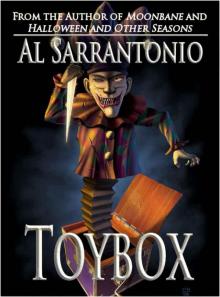 Toybox
Toybox Queen of Mars - Book III in the Masters of Mars Trilogy
Queen of Mars - Book III in the Masters of Mars Trilogy Exile
Exile Summer Cool - A Jack Paine Mystery (Jack Paine Mysteries)
Summer Cool - A Jack Paine Mystery (Jack Paine Mysteries) Return - Book III of the Five Worlds Trilogy
Return - Book III of the Five Worlds Trilogy The Orangefield Cycle Omnibus
The Orangefield Cycle Omnibus Summer Cool jp-2
Summer Cool jp-2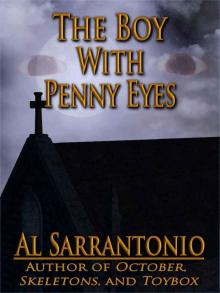 The Boy With Penny Eyes
The Boy With Penny Eyes Journey - Book II of the Five Worlds Trilogy
Journey - Book II of the Five Worlds Trilogy Kitt Peak
Kitt Peak Campbell Wood
Campbell Wood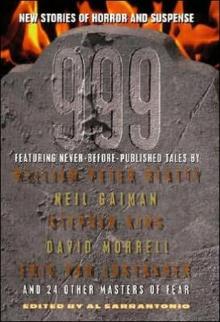 999
999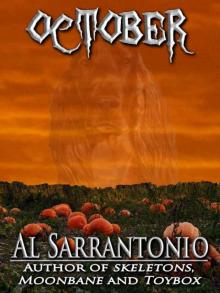 October
October Sebastian of Mars
Sebastian of Mars Moonbane
Moonbane Totentanz
Totentanz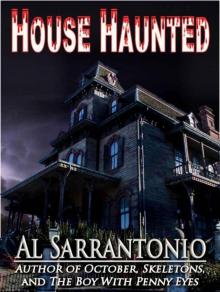 House Haunted
House Haunted Halloweenland
Halloweenland Hornets and Others
Hornets and Others